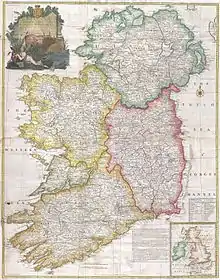Constitution of 1782
The Constitution of 1782 is the series of legal changes which freed the Parliament of Ireland, a parliament established by and subordinate to the Crown of England, of legal restrictions that had been imposed by successive Norman, English, and later, British governments on the scope of its jurisdiction.

_p119_THEGEOMETRICAL_ELEVATION_OF_THE_PARLIAMENT_HOUSE%252C_DUBLIN.jpg.webp)
These restrictions had, in effect, given the Lord Lieutenant of Ireland control over the parliamentary agenda and authority to restrict its ability to legislate contrary to the objectives of the monarchy.
The most constraining restrictions arose in Poynings' Law of 1495 ("An Act that no Parliament be holden in this Land until the Acts be certified into England"). These restrictions were lifted in 1782, producing a period of novel legislative freedom. This period came to be known as Grattan's Parliament after Henry Grattan, a major campaigner for reform in the House of Commons and leader of the Patriot Party. Amongst its many provisions the new constitution gave the Parliament greater control over the Royal Irish Army.
The new constitutional arrangements proved short-lived in consequence of the 1798 uprising by the United Irishmen. By the Acts of Union the Parliament of Ireland was abolished, and the Kingdom of Ireland absorbed into the new United Kingdom of Great Britain and Ireland, with effect from 1 January 1801.